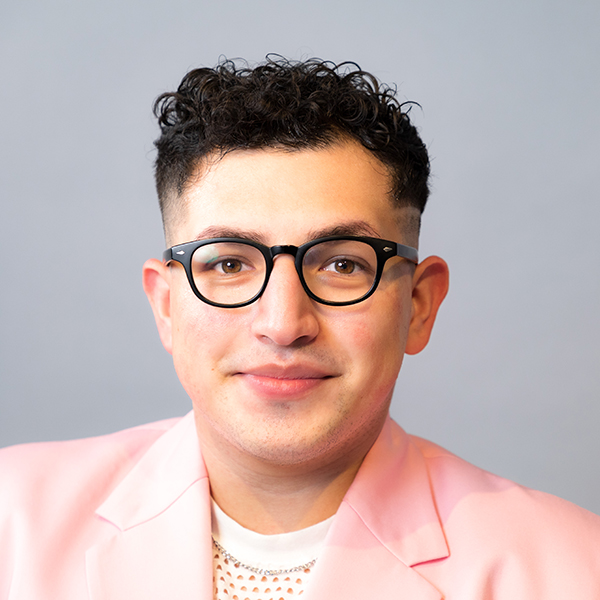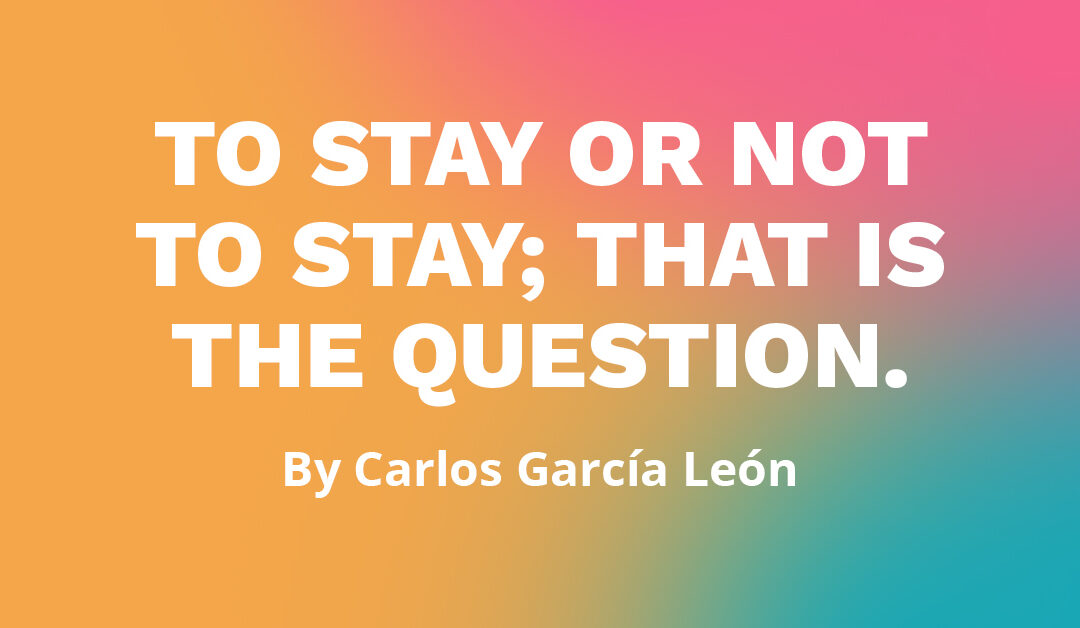By Carlos García León, Queer, non-binary, Mexican-Statesian, and anti-capitalist fundraiser
As the year is ending, and I enter my 3rd year fully integrated in the field of philanthropy and fundraising, the joke I have often been saying out loud is:
“I wish I was bad at my job.”
Now, hear me out. Do I want to be fired? No. Am I intentionally being bad at my job? No (but in Spanish). Do I want to continue challenging how and what fundraising looks like while also being in this cyclical capitalistic nightmare? Yeah…no.
My tenure, if we can even call it that, has been bumpy but not rough. The appeal of raising money for a good cause was short-lived as I had to become a gold medal hurdle runner to avoid all these pitfalls set for queer, non-binary, and people of color in this cis, hetero, white-dominated field. It has been manageable (shout out to my therapist for the added sanity) and it has also felt infinite, like I have been doing this for multiple years, not just a couple. I kid you not; my job has been graying me. Thus, as I enter the 3rd year — the point at which I can check the 3-5 year box in job position descriptions — in this field, I have some questions that you may or may not also be asking.
Why do I want to be bad at my job?
It would be so much easier to leave this job and this field, if I knew I was bad at it. That I wasn’t meant to be a part of this or wasn’t meant to start chipping away at the problems (the solutions of which I may or may not see in my lifetime).
The progress and pace of equity and community-centrism in our field have felt slow even after all the research, articles, and personal stories that have been shared. The battle feels like a Sisyphean task. Do not get me wrong. Has there been progress? Abso-freaking-lutely. Yet, continuing in this, and just the thought of it, is draining and overwhelming.
Am I a good fundraiser? If we were to look at data (as we know, data should not be the only way we view success, but it can provide some context), it would show I have raised more money and brought in new and lapsed donors, often surpassing the goals set for me. I like to credit much of that success to CCF and the ideals I have tried to center in my work.
Do I want to continue doing the work? Here is where you get me. It would be so much easier to leave this job and this field, if I knew I was bad at it. That I wasn’t meant to be a part of this or wasn’t meant to start chipping away at the problems (the solutions of which I may or may not see in my lifetime). But now that there is evidence that I am decent at it, that the longer I continue, the more I will achieve, and the more intertwined I will be in this field, it leaves me in this in-between space where I have to make a choice.
Since it is still early, could I have a bigger impact if I wasn’t in fundraising? In my specific arts fundraising niche? Let’s not even touch on the topic of salaries… I know that I could be making more money in the non-nonprofit world. These are just some of the dangers, harms, and doubts put into our work because of capitalism. Truthfully, many of these capitalistic pitfalls exist outside of the nonprofit world. It is not my wish to be — as a colleague once jokingly called me — an anti-capitalist. It is not that I don’t believe in capitalism, but I certainly do not believe in this version of capitalism that we live in that continues to exploit us for the sake of very few.
So why do we stay?
This writing is not meant to lure you one way or the other. If it does, I am glad it pushed you to make a decision (and I hope that they lead you to a path full of joy). My goal is to let you know that if you are having these thoughts, you are not alone.
For me, in the arts fundraising world I am in, the art form would have been enough to keep me going. Getting to see performances on a regular basis and witnessing the joy that both those on stage and in the audience received from participating in those moments.
Alas, the COVID panaderia made that practically obsolete. I stayed in my job because I needed a job and was so grateful that I wasn’t furloughed or let go.
Since my attachment to the work was no longer there, my involvement then became a survival instinct. When performing organizations returned to present their works, the joy from performances did not return for me. Much of this is because I could no longer overlook the overtly obvious fact that there is so much whiteness in the “classical” arts.
Do you have a heart?
If no one has told you, or if you haven’t told yourself, you have a heart that has a sense of justice and morality for yourself and your community, and that is a rare but beautiful thing.
There is a piece of me that thinks that we engage with nonprofits because we care and want to change the world. I think many of us do. We put up with the toxicity, sexual abuse, racism, heterosexism, harassment, and all the other awful things because we have a heart telling us that we are the person that can change that. And so I ask, why are we punished for having a heart? For caring? For being undervalued and underpaid?
I am good at my job because of my work ethic, but if I cared more about money would I be better? If I cared less about making change would the numbers change?
I can’t answer these questions for you, but what I can do is write that if you have had these thoughts before reading this, or if these are resonating with you for the first time, you should be celebrated. You have a heart. You do care. And yes, you shouldn’t be punished for that. But this inner dialogue is part of the change (and healing) of it all.
If no one has told you, or if you haven’t told yourself, you have a heart that has a sense of justice and morality for yourself and your community, and that is a rare but beautiful thing.
The Answer
There is no one-size-fits-all answer here. I am not a mental health professional or an accountant who can let you know what to prioritize or how to balance it. Yet, as fundraisers, we have seen that there is a network of people that continue to support one another as we navigate these questions. CCF itself is a network where I have found much support through this medium and other social forums.
As for me, I know I’m not stuck in this field of fundraising. I can always leave it for something else. I have seen many Hallmark movies that tell me to leave the city, visit some relatives in the woods where I’ll meet the love (or loves) of my life, and live happily ever after. Who knows, maybe paying less in rent is exactly what I need for more happiness.
For now, I’ll continue raising funds and inviting equity conversations to the donors who engage with me. For now, I am content with being a part of this change. An anti-capitalist fundraiser. An anti-capitalist fundraiser. This community. In some ways, this is a thank you to you for being a part of this movement.
Whatever you choose, may that path be full of joy for you and for the community you want to build.

Carlos García León
Carlos García León (he/they; el/elle) is a queer, non-binary, Latine, Mexican-Statesian, and fundraiser. They were born in Atlixco, Puebla, Mexico, but currently reside in the stolen land of the Peoria, Potawatomi, Kickapoo, and Kaskaskia tribes, also known as Chicago, Illinois and work as the individual giving manager of Chicago Shakespeare Theater. Their work, both in the arts and through writing, is driven by a fight for cultural equity, decolonizing the arts, and social justice. Outside of working and writing, Carlos likes to stream TV and movies, read a good book, learn German, take naps under their weighted blanket, drink milkshakes, and look for the next poncho to add to their collection. They can be reached via email or on Instagram, Twitter, and other social media platforms @cgarcia_leon. Tip them for their work via Venmo @cgarcia_leon or via PayPal using their email, cgarcia.leon@yahoo.com.
Discover more from CCF
Subscribe to get the latest posts sent to your email.


Thanks for sharing this perspective, Carlos! As a queer, first-gen latino who is knew to the work of fundraising, I can feel the sentiment. I’m learning a lot and luckily I’m with a great organization who is already doing the work to look at fundraising through a anti-capitalist, anti-racist and liberation lens. That said, there is lots to the work that I’m learning I’m going to have to “deal with” for lack of a better phrase and think to myself often if this is the “right choice”. The challenge being that I have all the skills needed to be pretty decent at this job and I’m liking many aspects of it. I’m also feeling “called” to the work – like I if I can be of use here, I have a responsibility to be of use here. Anyway – I’m sticking with this job for a few years at least since it’s providing stability. I’m glad that while I’m here I get to be part of meaningful work.